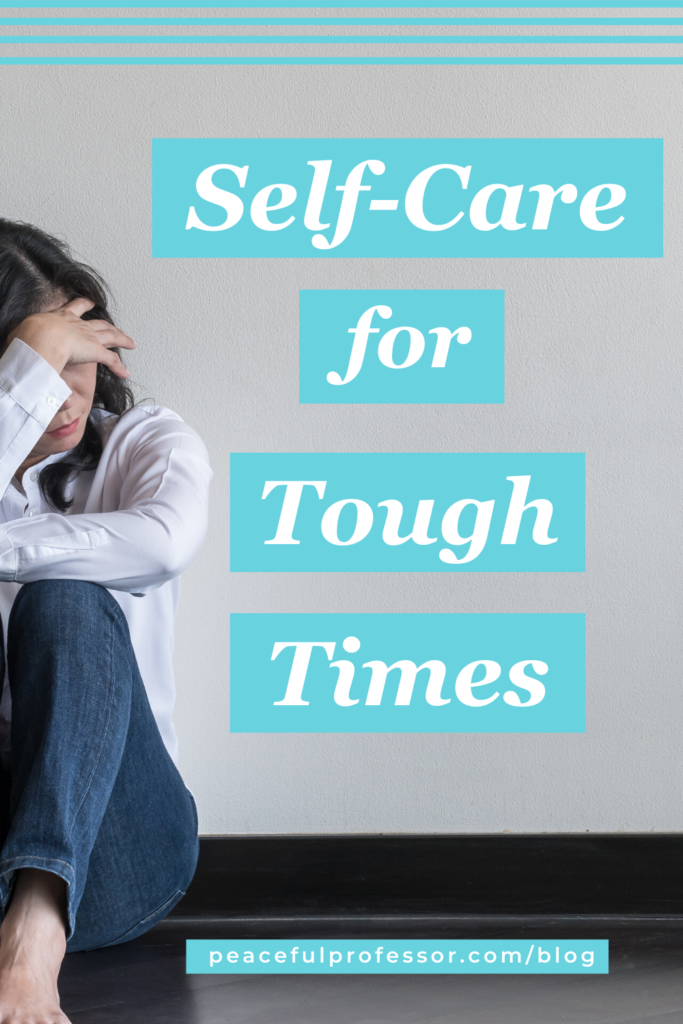It’s that classic Catch-22 situation: when we’re going through particularly difficult experiences, we often don’t have the time or energy to practice self-care. But this is when we need self-care the most.
So I’d like to share a few simple self-care strategies that don’t require a lot of time and you can practice by yourself, starting with basic needs you may be neglecting.
Drink water. When we’re upset, we may be crying, feeling nauseous, or have a lack of appetite. We’re not likely motivated to drink water when we feel this way, but being dehydrated can actually have a negative impact on mood. If you’re not a fan of plain ice water, hot tea is a wonderful, soothing alternative. In addition to providing hydration, drinking tea is a slow, calm activity that can relax both the mind and body. Chamomile, passionflower, lemon balm, peppermint, and ashwaganda teas are all good choices.

Breathe. When we feel anxious or overwhelmed, our breathing may become rapid and shallow. This may lead us to feel even more stressed, even panicked. Try taking very slow, deliberate breaths using your diaphragm. When you breathe deeply, your belly should expand on the inhale and collapse on the exhale. Inhale for the count of 4. Hold for the count of 6. Then breathe out for the count of 8 (counts, not seconds). Deep breathing is easier when you’re relaxed, so try listening to a guided meditation or self-hypnosis on YouTube, such as those by Tara Brach.
Sleep. When we’re sad, we often want to remain under the covers, and that’s okay. Honor your need to rest your mind and body. To encourage sleep, try these techniques: Wear or cover yourself in something that brings you comfort, such as a favorite T-shirt from an old friend or a blanket you’ve had since childhood. Try to make your room as dark as possible and cool (65°F / 18.3°C). Sprinkle lavender essential oil on a tissue and place it inside your pillowcase. Turn on some relaxing music, watch ASMR videos, or use a white noise app.
Repeat a mantra. While practicing deep breathing, try incorporating a mantra. Mantras are repeated sounds or words used to focus the mind and imprint beneficial beliefs into the subconscious. You are likely familiar with yogis repeating the mantra “Om” when they meditate. The following mantra is one of my favorites when my heart aches or I’m feeling anxious and afraid: “I am calm, strong, and centered. I am able to let go of fear. I am worthy of peace and tranquility.” For those who feel frequently threatened due to being part of a marginalized group, letting go of fear may not sound possible. Try this mantra instead: “I am present within myself. I can center myself with the ease of my breath. I feel grounded, worthy, and whole.” While these mantras may not feel true to you in this moment, with repetition, they will plant the ideas in your subconscious mind, eventually encouraging greater peace. They also provide something concrete to concentrate on while practicing deep breathing, grounding us in the present.
Take a shower or bath. When we bathe mindfully, we cleanse our minds as well as our bodies. Rather than hurrying through your shower, take time to simply stand under the stream and pay attention to the sensation of water trickling down your neck and back. If you’re in the tub, move your hands or feet to create ripples and notice how the water feels lapping against your body. Adding essential oils to your bath or shower can heighten your relaxation. For a shower, add a few drops of oil to a cloth and place it over the drain for a couple minutes while you breathe in the scent. Lavender, rose, vetiver, marjoram, and ylang ylang are known for alleviating stress, anxiety, grief, and “hot” emotions like anger.
Draw or Write. Research has found that creating visual art (such as drawing or painting) has a positive effect on cognitive function and mood. It’s no wonder adult coloring books have become so popular — the act of coloring is meditative for many people. If you’re not a fan of drawing or coloring, writing in a journal could offer cathartic release or a way to articulate your emotions. No matter what you create, it’s important to create freely without judgement. Now is not the time to critique your skill or style. Just enjoy the process of making something.

Go outside. While it may be the last thing you want to do, exposing yourself to sunlight and nature offers an incredible mood-boost. There are countless studies demonstrating the positive effects of walking in some kind of green space, such as a park or nature trail. If being in public is not possible, do you have a patio, balcony, deck, or front stoop you could sit on? Even opening your window to let in some sun can be beneficial.
Feel. Our brains are wired to avoid pain, so we often try to push it away or find ways to numb ourselves. But denying our true feelings can exacerbate depression and lead to illness. For the time-being, don’t judge your feelings, analyze them, or ignore them. Feel them as they are. This may cause you to experience a rush of overwhelming emotion and that’s okay. Practice deep breathing and remember that the more we are able to sit with our intense emotions, the more we are able to see our way through them. When I’m struggling, I try to remember this: Despair is what happens when you fight sadness. Compassion is what happens when you embrace it.
But if it becomes too much, reach out to a trusted loved one or consider seeking help from a licensed therapist. There are also a variety of organizations that offer support over the phone, such as the Crisis Text Line. If you’re not in crisis but still would like to talk to someone, try a “warm line.” These are typically free, confidential peer-support services staffed by people who have experienced mental health conditions themselves.
I hope these suggestions encourage you to take care of yourself and those you love. During tough times, we need to practice self-care even more. It doesn’t have to take much time and doesn’t require any money. Just take a moment to breathe deeply, repeat a mantra, hug someone, or watch the sun set. Do something to bring yourself comfort because, as the saying goes, “you can’t pour from an empty cup.”
Additional Resources:
- Simple Self-Care Practices for Hard Times (a replay of one of my IGTV virtual coffee dates in which I share quick, simple, and free self-care practices that are accessible to everyone)
- 4 Self-Care Resources for Days When the World is Terrible (wonderful resource for those in marginalized groups)
- Self-Care for Tough Times by Suzy Reading (Kindle, paperback, and audio book)
- The Importance of Sadness (Mindful.org)
- Battling the Physical Symptoms of Stress (Mindful.org)
- Self-Compassion Guided Meditations and Exercises by Dr. Kristin Neff
Disclaimer:
Please note that I am not a medical doctor or a therapist. This post is designed for educational and/or informational purposes only and should not be used in any other manner. This information is not intended to substitute informed medical advice. You should not use this information to diagnose or treat a health problem or disease without consulting with a qualified healthcare provider. A consultation with your healthcare professional is the proper method to address your health concerns. You are encouraged to consult your healthcare provider with any questions or concerns you may have regarding your condition.


1 Comment on Self-Care for Tough Times